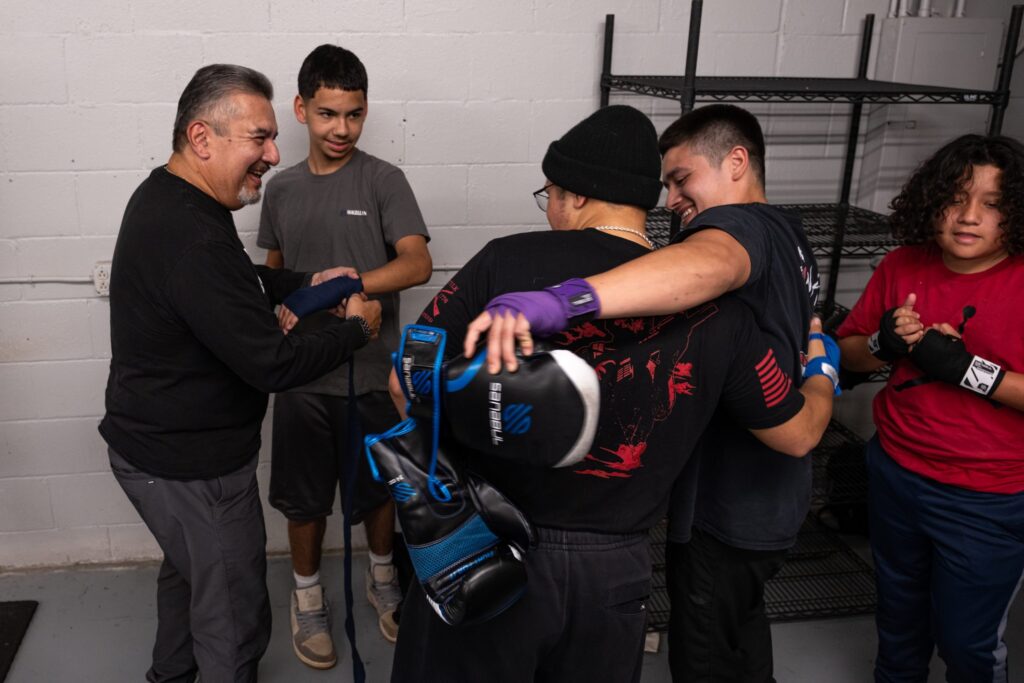Esperanza Gutierrez, 18, is pounding away at the boxing pads with all her might, sweat dripping down her forehead.
She stopped for a moment to catch her breath. Her boxing coach waited patiently for Gutierrez. He didn't push her past her limits.
She nods and the training continues. She throws a left punch and her coach waves his padded hand.
For Gutierrez, boxing is a safe haven and a Thursday night commitment. She doesn't box to train for a fight, she does it as a form of therapy.
Gutierrez is a patient of Therapeutic Boxing, a program founded by former professional boxer Paul Anthony “Paulie” Ayala and licensed therapist Jaime Corona at Hard Knocks University Boxing Gym in west Fort Worth.
Therapeutic boxing combines counselling and sport to help teens and young adults overcome trauma, develop healthy social skills and become independent.
“Important to healing”
Corona, who also owns New Horizon Counseling Center, was looking for a new form of treatment to address issues that kept coming up during her counseling sessions.
He remembers attending Paulie Ayala's University of Hard Knocks class and being immediately drawn to the boxing gym.
Observing Ayala and the compassionate way he ran the gym, Corona came up with the idea to combine counseling services with boxing, which he believed could help improve behavioral issues for young patients.
“I see a lot of traumatized cases, kids who've lost a parent to murder, kids who are struggling with suicidal thoughts,” he said. “They come in for therapy, we talk about it, we process it, but then they're back in this battlefield where they re-experience the trauma. I needed to find a way to take the fear out of them.”
Corona approached Ayala with the idea of combining their expertise for a new program, which Ayala thought would fit with the community-focused approach of his boxing gym. After months of preparation, Therapeutic Boxing launched in March 2016.
“When we first started, I saw this as a challenge for me,” Ayala said. “I'm not going to prepare my kids for the ring, I'm going to prepare them for life.”

Through Therapeutic Boxing, referred patients, ages 15 to 21, receive individual counseling and participate in private boxing classes led by trainers Ayala from Hard Knocks University.
Corona said that to ensure participants' safety, parents or family members will not be allowed to be present during the lessons.
“Sometimes parents bring their kids in thinking their kid is going to be a professional boxer, but this program isn't about that,” he says. “What Ayala does is emphasize the kids' strengths. He doesn't yell at them. Exercise is important for mental health, which is important for healing.”
According to the Mayo Clinic, a university medical center, studies on depression, anxiety and exercise have shown that exercise can help improve mood and reduce anxiety.
The program is also designed to meet the needs of patients: Corona said patients don't have to attend a set number of boxing classes.
“You can come when you need to,” he said. “If you miss three classes, there's no restriction. We don't turn students away. We accept them as long as they're here. It works better that way.”
Gutierrez has been a therapeutic boxing patient since late 2022. She was initially overwhelmed by the program but was relieved to learn she would not be judged. She said the program has helped improve both her physical and mental health.
“I've had a lot of counselors over the years, but Jamie has been the one who's helped me the most,” Gutierrez said. “Boxing has given me more confidence than anything else. Taking private lessons helps me escape the grind, especially when it comes to family life.”

Measuring success
The founders of Therapeutic Boxing measure the success of their program by how many young people's lives they've been able to impact, and it always brings a smile to their faces when former patients return to the boxing gym to share their stories.
Corona said more than 500 people have participated in therapeutic boxing since it began.
“Some of these kids are in fight-or-flight mode at first,” he says, “and when they come back, they thank God they got out of that dark world they were in, because a lot of them don't see any hope. It's so satisfying to see them progress. In a way, it may seem selfish, but I think that's what keeps me going.”
Corona hopes that other licensed therapists will establish similar programs at other boxing gyms in North Texas.

Therapeutic boxing has become a second home for Gutierrez, but she will soon be saying goodbye.
In a few months, she'll be moving to San Antonio to attend Palo Alto University. “It's bittersweet to think about leaving,” she says.
Still, she is grateful for the guidance and support she received from Ayala and Corona.
Gutierrez plans to find a gym in San Antonio that is as welcoming and supportive as University of Hard Knocks.
For now, Gutierrez plans to hang up the boxing gloves, but she knows that's not the end.
David Moreno is a health reporter for the Fort Worth Report. His position is supported by a grant from Texas Health Resources. He can be reached at david.moreno@fortworthreport.org or David Report.
Camilo Diaz is a multimedia fellow at Fort Worth Report. He can be reached at camilo.diaz@fortworthreport.org.
At Fort Worth Report, news decisions are made independent of our board of directors and financial backers. Read more about our editorial independence policy here. here.


